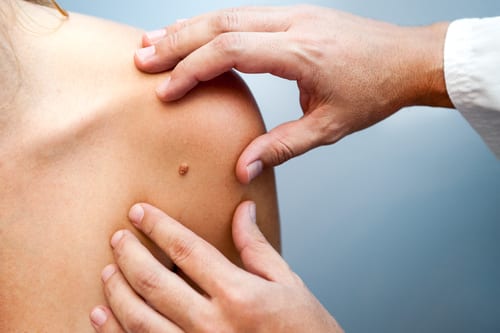Skin Cancer | The Office of Dr. Vincent Hung
Skin cancer is the most prevalent type of cancer found anywhere in the world. The good news is, while it is still cancer and must be addressed in a timely fashion, even the most severe forms of skin cancer are potentially curable as long as they are treated in a timely fashion. Risk factors for skin cancer range from genetic predispositions to your actions and habits. The following is an overview of what causes and puts you at risk for skin cancer.

Types of Skin Cancer
There are three general forms of skin cancer.
Basal Cell Carcinoma
- The most common form of any cancer
- Will not spread throughout the body
- Cannot become melanoma
- Usually not painful, though bleeding and crusting can be present if untreated for some time.
- Treatable with Mohs surgery
Squamous Cell Carcinoma
- Not as common as the basal cell but more common than melanoma
- Usually related to sun damage
- Arises from precancerous lesions known as actinic keratosis
- Most are slow growing and easily treated
- Small subsequently can grow rapidly and be extensive. This is more likely in transplant patients, immunocompromised patients.
Melanoma
- Potentially the most severe form of skin cancer
- Can resemble regular brown or black moles but can also be pink, red, purple, blue, or white
- Can spread to other parts of the body
- Early diagnosis and treatment is vital
- Treated with surgery, but generally not with Mohs surgery
What Puts You at Risk?
Sun Exposure
We’re all familiar with the fact that excessive sun exposure causes premature aging and the onset of fine lines, wrinkles, and age spots. Unfortunately, sun exposure doesn’t stop there. Sun exposure is the foremost cause of skin cancer, said to be responsible for 90 percent of non-melanomas and 86 percent of melanomas. The sad fact is that as much as we love the feeling and warmth of the sun, it’s damaging to the quality of our skin and health. Sun damage comes from both UVA and UVB rays, and any amount of sun to unprotected skin contributes to this damage. You can experience sun damage even if your skin doesn’t show a sunburn. While most sun damage occurs early in life, sun damage collects and compounds throughout adulthood.
Moles
We all have moles spread throughout our body. Many of these are normal moles, small brown blemishes that are not damaging or threatening to your body. Unfortunately, while there are normal moles, there are also atypical moles referred to as dysplastic nevi. This type of mole can be a precursor to developing cancer, and the more moles you have, the greater the risk.
Skin Type
Although not always the case, patients who have fairer skin with naturally lighter hair and eyes have an increased rate of developing skin cancer.
Family History
At almost any doctor’s visits, you are likely going to be asked about whether or not a family member has had melanoma. This is because genetics can play a role in melanoma.
How Can You Protect Yourself?
While skin cancer is treatable, it is still necessary to protect yourself against skin cancer. How do you do this? The easiest way is to reduce sun exposure. Don’t spend extended lengths in the sun without adequate sun protection like hats, glasses, or clothing. Sunscreen lotion should cover any bare skin and should be reapplied if you are expecting to be out in the sun longer. In addition to the sun, tanning beds should be avoided as they also expose your skin to ultraviolet rays and increase your risk of skin cancer.
All moles should be observed. If you notice any new moles or if your existing moles are changing in size, color, or shape, see your doctor immediately to be sure that it isn’t cancer. While not all forms of skin cancer are necessarily life-threatening, all must be addressed and treated as early as possible. Cancer cells will expand, invade, and destroy other tissues.
To learn more about the causes of skin cancer, or to see if Mohs surgery is right for you, contact Dr. Hung by calling his Pasadena office at (626) 432-5032 or his Newport Beach office at (949) 574-8292 to set up a consultation.
